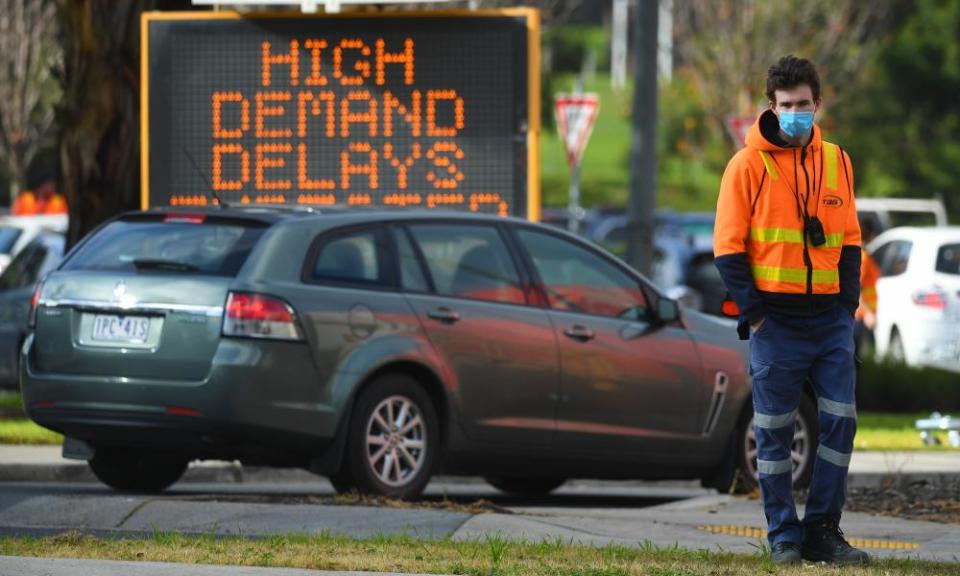Coronavirus Victoria: Woolworths reintroduces purchase limits as military called in to help

Victoria has reintroduced limits on purchases in supermarkets and has called in the military as a spike in Covid-19 cases over the past week has placed renewed pressure on testing facilities and sparked a rush on supermarkets for supplies.
A Victorian government spokeswoman confirmed state officials had asked the commonwealth to provide more than 300 Australian Defence Force troops. Of those, a small amount will be delegated to quarantine hotels. Defence support is already being used at quarantine hotels in New South Wales. So far, Victoria has relied on police to ensure returned travellers remain in mandatory isolation for 14 days.
Other military staff with medical training will assist Victoria in setting up more testing clinics and in running tests. More details would be announced in coming days, the spokeswoman said.
A spokesman for the prime minister said ADF personnel were already on the ground working with Victoria on planning support.
“The commonwealth departments of defence and health are working with Emergency Management Australia to expedite a request for assistance from Victoria after the state control team determines what support it requires,” the spokesman said.
Related: Victoria's coronavirus spike: is this a second wave, and what's causing the clusters?
On Wednesday Australia recorded its first Covid-19 death in a month, with Victoria’s chief health officer, Dr Brett Sutton, announcing that a man in his 80s died, bringing the country’s total death toll to 103.
Victoria has reported double-digit rises in new cases every day for more than one week. Plans to allow more people into restaurants and to increase visitors to households were revoked as the state tries to contain further spread.
Fears about further virus spread and renewed lockdowns has prompted a renewed round of panic-buying, prompting Woolworths to once again impose purchase limits in Victoria previously implemented across Australia early in the pandemic.
In a statement the supermarket chain said: “Woolworths has reinstated a purchase limit of two items on toilet paper, hand sanitiser, paper towel, flour, sugar, pasta, mince, long-life milk, eggs and rice across its Victorian stores this afternoon. The preventative move is in response to significantly elevated demand seen over the past 24 hours in certain parts of Melbourne. It will support social distancing in stores and ensure more customers have access to the products they need.”
Twenty new cases of the virus were announced by Sutton on Wednesday. The new cases include three staff members who tested positive at Hampstead dental clinic in Maidstone, 8km north-west from Melbourne city. There are now 241 cases that have been identified since the epidemic began in Victoria that indicate community transmission, an increase of eight since Tuesday.
“That number has been around 10 every day, but a decrease to eight is somewhat encouraging,” Sutton said. “It certainly means we’re not getting an increase or an exponential increase in community transmission cases day by day.”
But the rise has health authorities, including those interstate, concerned. Testing has been increased across the most affected council areas where “hotspots” of the virus have emerged including in Hume, Brimbank, Moreland, Darebin, Cardinia and Casey. Almost one in five Victorians live in these areas.
On Wednesday the New South Wales premier, Gladys Berejiklian, reiterated her warning to NSW tourism businesses to avoid taking bookings from Victorian travellers from hotspot locations, and warned NSW residents not to travel to those areas. She told the ABC that while she was confident the increase in cases was “manageable”, it was also “a good wake-up call to remind us about how contagious the disease is and how quickly it can get out of control”.
“Whilst community spread is still what it is, whilst people are still chasing those contacts to warn them, to self-isolate and do all those things it’s just common sense to make sure that NSW businesses and organisations avoid any interaction with anybody from those hotspots unless they know that person has been cleared and doesn’t have Covid,” she said.
Sutton said three new cases were linked to an outbreak that occurred within a large family living in Keilor Downs, a suburb 18km north-west of Melbourne in the council area of Brimbank. That brings to 15 the total number in that family outbreak. An early learning centre in Essendon was closed on Wednesday morning after a child tested positive. Contact tracing and cleaning were under way. Sutton said the family of the elderly man who died overnight had requested privacy and that no further information be given.
Large teams of public health workers have been door-knocking in the suburbs most affected to ensure people are aware of social distancing and hygiene requirements and where to get tested. Further efforts have been made to engage people from culturally and linguistically diverse communities. Sutton said many of the recent cases were a result of families visiting each other as restrictions eased, even if they were unwell or awaiting test results. Health guidelines are clear that anyone who is unwell with even mild symptoms should get tested, isolate themselves until the test results come back, and continue to isolate for 14 days if they test positive.
Sutton said across all communities, there were people who were suspicious of government health advice, listening to misinformation, and failing to do the right thing.
“I think it’s an issue in pockets of communities everywhere,” he said. “This is not an easy behavioural task to go through. And when the levers of government really change every aspect of your life are in place, people go to other sources of information that question it. I think there are pockets and individuals and networks within every single community where there are suspicions about the key messages and where there is misinformation that’s circulating quite freely. So we need to compete in that space and make sure that the evidence-based messages are out there in full.”

 Yahoo Sports
Yahoo Sports 